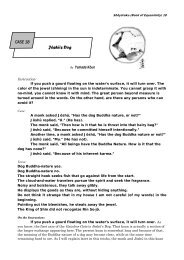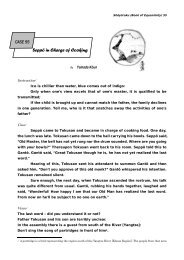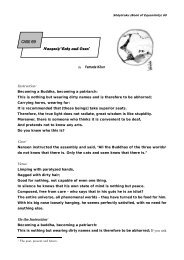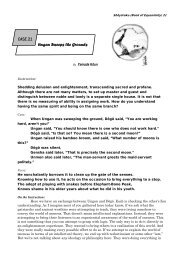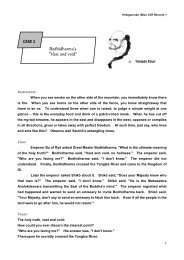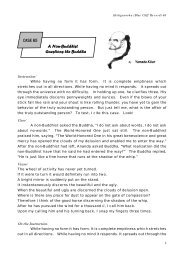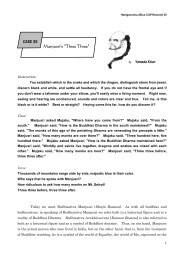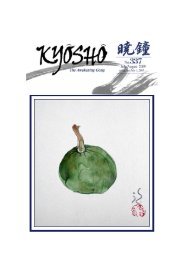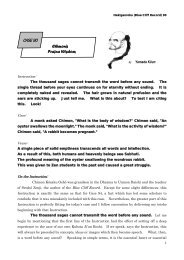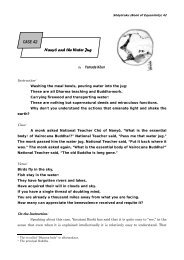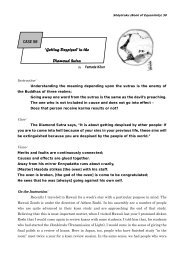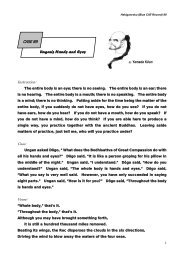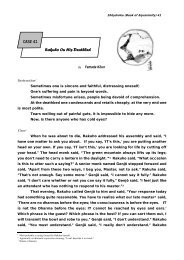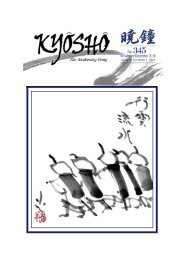Create successful ePaper yourself
Turn your PDF publications into a flip-book with our unique Google optimized e-Paper software.
Shôyôroku (Book of Equanimity) <strong>33</strong><br />
CASE <strong>33</strong><br />
Sanshô’s Golden Scales<br />
By Yamada Kôun<br />
Instruction:<br />
Meeting the strong, be weak; meeting the soft, be hard.<br />
If both are robust and smite each other, there will surely be a wound.<br />
Tell me, how do you meet your foe without collision?<br />
Case:<br />
Sanshô asked Seppô, “When a fish with golden scales has passed through<br />
the net, what should it get for food?” Seppô said, “I will tell you when you have<br />
passed through the net.” Sanshô said, “A great Zen master with 1500 disciples<br />
doesn't know how to speak.” Seppô said, “The old monk is just too busy with<br />
temple affairs.”<br />
Verse:<br />
When the carp first ascends the three tiers of waterfalls, the heavens send<br />
clouds and thunder to accompany him;<br />
Bravely leaping and vigorously jumping, he shows his great function.<br />
With his tail burnt up [and turning into a dragon], he clearly surmounts the Gates<br />
of Yu;<br />
The magnificent fish will never be thrown into a vinegar pot.<br />
An old matured man does not startle other people;<br />
Accustomed to meeting great foes he has no fear from the beginning.<br />
Fluttering like a pinwheel of five ounces,<br />
As a massive mountain, far more than a thousand tons.<br />
Famed over the four oceans—who could be his peer?<br />
He stands alone, never to be moved by the eight winds blowing.<br />
On the Instruction:<br />
This same koan also appears as Case 49 of the Blue Cliff Record. Since the way of<br />
appreciating and treating the koan is slightly different in the two versions, it would be helpful
Shôyôroku (Book of Equanimity) <strong>33</strong><br />
to compare them. This is a mondo (Zen exchange) between Sanshô and Seppô. Let’s look at the<br />
Instruction.<br />
Meeting the strong, be weak; meeting the soft, be hard. A truly accomplished<br />
Zen person, that is, a person who has truly plumbed the depths of the way, a person of a<br />
ripened state of consciousness, will meet a strong attack with weakness. On the other hand, if<br />
the other person comes on softly, you respond with strength. The true Zen person must be able<br />
to do this with perfect freedom. Most people, if faced with a strong opponent, will tend to also<br />
come out strongly.<br />
If both are robust and smite each other, there will surely be a wound. In<br />
other words, if the two opponents both come on strongly, someone is bound to get hurt, perhaps<br />
even both of them. But a truly accomplished person will be able to receive a strong attack with<br />
mildness and softness, like the wind blowing through the willow. However, I’m not saying that<br />
only soft is OK. If the other party comes on softly, you must have the ability to respond with<br />
strength. That’s the whole principle of judo or aikido. In karate, for example (which evidently<br />
came originally from Okinawa) you meet force with force. In judo, however, you have the “soft<br />
way” (the actual meaning of the word “jûdô”), and when the opponent comes on strongly you<br />
use the strength of the opponent to do a turnabout and then throw him. If the opponent attacks<br />
you with force you use that force so that the other person falls down as the result of his own<br />
force. This is the essence of judo. The same holds for kendo or swordsmanship in the Japanese<br />
tradition. When you meet each other head on and the opponent takes a step forward, you take a<br />
step backwards. If you move forward, the other person withdraws. That’s the kind of spirit and<br />
concentration you find in a standoff between two masters. If both were to come on strong in an<br />
attack, both would end up getting hurt probably. If you want to cause your opponent to fall with<br />
out getting hurt yourself, you have to respond with softness when the opponent comes on<br />
strong and with strength if the other person comes on softly. This type of fighting spirit and<br />
concentration is essential, although not easy to attain.<br />
To respond with softness toward strength is very hard to do. If iron strikes against iron,<br />
sparks are sure to fly. But if iron meets with tofu bean curd, what will happen? No sparks will<br />
fly. There’s an interesting story in this connection concerning the Shinto saint Kurozumi<br />
Munetada the founder of the so-called Kurozumi Teaching (Kurozumi-kyô, a branch of<br />
Shintoism). He was a truly outstanding person. If you have a chance you should read the book<br />
he authored. 1 He is a person who clearly saw through the world of Mu, although in his<br />
language he refers to it as Ameterasu Ookami. Nevertheless, he clearly realized the satori of<br />
Zen. One day he was engaged in a discussion with a samurai which concerned the following<br />
question: If a bell is hit by tofu bean curd, is there a sound or not? Kurozumi said that if a bell<br />
1 English books on the subject include: The Living Way: Stories of Kurozumi Munetada, a Shinto Founder (Alta Mira Press, U.S.<br />
(June 2000).<br />
2
Shôyôroku (Book of Equanimity) <strong>33</strong><br />
and tofu hit each other, there’s probably no sound. The samurai disagreed, and a discussion<br />
ensued. At some point the samurai prodded Kurozumi with the question, “Do you really think<br />
it doesn’t make a sound?” and this time Kurozumi said, “No, it makes a sound.” It takes a real<br />
master to be able to react like this. If each is simply trying to have his way, someone ends up<br />
getting hurt.<br />
Tell me, how do you meet your foe without collision? How do you bring order<br />
to things without a standoff and collision? An example will now be given and we should look<br />
carefully.<br />
On the Case:<br />
Sanshô asked Seppô, “When a fish with golden scales has passed through<br />
the net, what should it get for food?” Sanshô, as you might know, was the sole dharma<br />
heir of Rinzai Daishi. Just prior to Rinzai’s passing, Sanshô was at his side. Rinzai said, “After<br />
my death, do not destroy our essence of true Dharma.”<br />
Sanshô said, “Who would dare to destroy the essence of the true Dharma of Your<br />
Reverence?”<br />
Rinzai said, “If someone asks you about it, how will you respond?” (This was a final<br />
checking question).<br />
Sanshô instantly shouted, “Katsu!”<br />
Rinzai was no doubt very happy on hearing this.<br />
Rinzai said, “Who knows that my essence of true Dharma has been destroyed by this<br />
blind donkey?”<br />
It might be a bit difficult at first blush to know what’s going on here. As long as there is<br />
anything like an “essence of a true Dharma”, it is not the genuine article. From the standpoint<br />
of the first principle, of course, even if it’s a concept it’s OK. But with his shout of “Kaaatsu!”<br />
Sanshô blows everything away and no concepts remain. Rinzai realized this and knew that this<br />
was truly inheriting his dharma. In the world of Buddhism concepts abound, all the product of<br />
intellectual thinking. Unless you sweep those concepts away, you will remain unable to grasp<br />
the real thing. Recall Mumon’s words in Case 1 of the Gateless Gate: “If you meet a Buddha,<br />
you will kill him; if you meet an ancient Zen Master, you will kill him.” He’s telling us that we<br />
have to cut away all concepts of Buddha. Sanshô, with his great cry of “kaatsu!,” also sweeps<br />
away all concepts of “the essence of the true Dharma.” He had a very clear Zen understanding.<br />
Following Rinzai’s passing, Sanshô went on pilgrimages to meet outstanding masters and<br />
engaged in Zen exchanges with them to polish his own state of consciousness. This koan relates<br />
an exchange he had with Seppô upon visiting the latter’s temple. Seppô appears in any number<br />
of koans and was no doubt quite advanced in years at the time of this exchange. He was<br />
probably more than 80 years old. As for Sanshô, as far as I can surmise by perusing this koan,<br />
he was probably in his 30’s or already pushing 40 at the time of the encounter. There is no<br />
doubting that he was quite clear in his Zen realization. The ancients were truly great! When<br />
3
Shôyôroku (Book of Equanimity) <strong>33</strong><br />
Dôgen Zenji returned to Japan from China upon inheriting the dharma of Nyojô Zenji, he was<br />
only 29. There is his famous saying upon returning: “I return home with empty hands.”<br />
Immediately after his return he authored the Fukanzazengi (Universal Recommendation of<br />
Zazen). When we read that text, we are amazed that a mere youth of 29 years could pen such a<br />
work. As mentioned, Sanshô was no doubt in his thirties at the time of this exchange, although<br />
this is merely my conjecture and by no means proven historically. At any rate, Sanshô came to<br />
visit Seppô and spoke as follows: “When a fish with golden scales has passed through the net,<br />
what should it get for food?”<br />
A “net” is used to catch fish. We are dealing here with a fish that has bitten through<br />
that net and obtained its freedom. A “fish with golden scales” means a truly large and splendid<br />
fish. What is the net? It is our concepts and ideas. Sanshô means someone who has eliminated<br />
all concepts, including ideas of Buddha or Dharma and Buddhism. He asks Seppô how he will<br />
deal with him in asking how it will be fed. Needless to mention, Sanshô is referring to himself.<br />
Such a question is known in Zen as kenjumon (“question testing the host”). The question is<br />
posed with the intention of seeing how the other person will respond. Although he does not say<br />
it outright, Sanshô says in effect: “I have eliminated all concepts, how will you deal with me?”<br />
In terms of kendo or swordsmanship this is the stance in which one holds one’s sword over one’s<br />
head, poised for attack. How does Seppô respond?<br />
Seppô said, “I will tell you when you have passed through the net.” Sanshô’s<br />
first statement assumes that he has already passed through the net, but Seppô does him one<br />
better in telling him that he’ll discuss the matter when he passes through the net! This, too, is<br />
holding your sword high over your head (jap, daijôdan). This could go on, with each outdoing<br />
the other, ever upward. Here is Sanshô’s reply:<br />
Sanshô said, “A great Zen master with 1500 disciples doesn't know how to<br />
speak.” He says in effect: “Master Seppô, I have heard that you are a great master with 1,500<br />
disciples and for this reason I came to visit you. But on meeting you I find that you do not even<br />
know how to conduct a Zen exchange.” Being still young, Sanshô immediately attempts to go<br />
beyond Seppô with his reply. How does Seppô respond?<br />
Seppô said, “The old monk is just too busy with temple affairs.” In other<br />
words, “I’m so busy these days with this and that that I don’t have the time to spend with you. I<br />
hope you’ll excuse me.” He seems to be retreating but such strength is hard to come by. You<br />
have to get older for such strength to appear. I’m not just saying so because I myself am<br />
growing old! Please recall the words of Yamamoto Gempô Roshi that I often cite. “Better than<br />
your 60’s is your 70’s, better than your 70’s is your 80’s, better than your 80’s is your 90’s, better<br />
than your 90’s is after you die.” It’s only when you grow old that you become truly free. There<br />
are samples of Gempô Roshi’s calligraphy among treasures on store at Ryûtakuji Temple in<br />
Mishima. It consists of a couplet written in large characters. I don’t know how old he was when<br />
he wrote it, but it’s a truly wonderful sample of his calligraphy. I often feel strongly that I<br />
would love to be able to write like that. The couplet consists of two lines from a poem by the<br />
4
Shôyôroku (Book of Equanimity) <strong>33</strong><br />
Chinese poet Wang Wei:<br />
I walk to where the waters end/And sit and watch the clouds arise.<br />
Yamamoto Gempô Roshi evidently told people when he was over ninety years old that<br />
he had the feeling he could finally write calligraphy more freely. It’s not just a matter of<br />
calligraphy; the same holds for the human heart. You have to grow older to really experience<br />
this. All of you must do your best to reach an advanced age. Even though you have practiced<br />
Zen, unless you reach old age, such plain and unadorned savor cannot emerge. Among the<br />
students of Bassui Zenji in the Edo period was Takusui Zenji, who reportedly lived to be more<br />
than 120 years old. He was a great admirer of Bassui’s teachings, following to the letter the<br />
preachings of Bassui as found in the book known as the Enzan Kana Hôgo (Dharma Talks of<br />
Enzan in the Kana Syllabary) and reaching great enlightenment. In his later years, no matter<br />
what he was asked he would reply with the words jinjin-mimyô nari (“it is deep and subtle”)<br />
and state that he could say nothing about it. Sanshô’s state of consciousness is, to be sure, very<br />
wonderful and penetrating, but compared to Seppô he is still young, I feel. To repeat, please try<br />
to live somehow to an old age. If you practice Zen you will lose your fear of death. That’s all very<br />
fine, since most people are terrified of dying. Actually it is our fear of death that brings us to<br />
the practice of Zen in the first place. You carry on doggedly without stopping until you resolve<br />
this problem. One of my cousins is a former manager in a company. Recently he confided to me,<br />
“Kyôzô, these days I’m so scared of dying.” I said to him, “Oh, is that so? You’ve come to a very<br />
good place if you can say that.” But now he’s close to ninety and it’ll be quite a task, but if he<br />
practices zazen he’ll lose his fear of dying. But I went on to tell him the following: “But actually<br />
that’s still not enough. You have to be able to retain your inner peace no matter whatever the<br />
outer circumstances are like.”<br />
I recall in this connection the words of Dôgen Zenji.<br />
“Because a Buddha is in birth and death, there is no birth and death. Because a<br />
Buddha is not in birth and death, a Buddha is not deluded by birth and death.” The section<br />
about a Buddha in birth in death means clearly realizing your own essential world. There you<br />
will find no birth and death. But satori is still remaining. The section about “Buddha is not in<br />
birth and death” is the stage where even that satori disappears. If satori disappears, there is no<br />
more being deluded by birth and death. When you live there is just that living. When you die<br />
there is just that dying. There is no problem. I would like all of you to reach this stage. When I<br />
say it like this, you might assume that I have reached that stage, but it’s surprisingly difficult<br />
to become like that. Nevertheless, that is what I would like to reach.<br />
On the Verse:<br />
When the carp first ascends the three tiers of waterfalls, the heavens<br />
send clouds and thunder to accompany him.<br />
Bravely leaping and vigorously jumping, he shows his great function.<br />
With his tail burnt up [and turning into a dragon], he clearly surmounts the<br />
5
Shôyôroku (Book of Equanimity) <strong>33</strong><br />
Gates of Yu. This story about the carp ascending the waterfall often appears in the koans. In<br />
ancient times in China there was an illustrious ruler name King Yu. The river in his kingdom<br />
overflowed its banks, causing great distress for the people. The king had a large mountain<br />
excavated to create a waterfall with three tiers and allowed the river water to flow through it.<br />
That mountain is known as Dragon Gate Mountain or Yu Gate. The waterfall has three tiers or<br />
stages. When spring comes and the peach blossoms bloom, the carp swim upstream and ascend<br />
this large three-tiered waterfall, upon which they become dragons, it is said. At that time, there<br />
are clouds and thunder to accompany that event. The tails of the fish are burnt away and they<br />
become dragons that fly up into the sky.<br />
The process by which we practice zazen fervently and attain satori is compared to the<br />
process by which the carp becomes a dragon. As a result of our practice we realize great<br />
enlightenment, which is compared here to a carp climbing up a three-tiered waterfall, having<br />
its tail burned off and becoming a dragon. This is accompanied by clouds and the sound of<br />
thunder. This is all talking about Sanshô in the koan: “Bravely leaping and vigorously jumping,<br />
he shows his great function.” It is this wonderful activity. The original Chinese also has the<br />
meaning of the dragon showing his horns. This refers to the great activity of Sanshô in the<br />
koan with his bold question: “When a fish with golden scales has passed through the net, what<br />
should it get for food?” There’s a feeling of mettle and spirit from head to toe.<br />
With his tail burnt up [and turning into a dragon], he clearly surmounts the<br />
Gates of Yu. This is also about Sanshô’s wonderful spirit and activity. Make no mistake, he’s<br />
definitely enlightened and it’s no fake. He is the man who has turned into a dragon having<br />
climbed the heights. But then comes the next line of the verse:<br />
The magnificent fish will never be thrown into a vinegar pot. The vinegar pot<br />
is a large jar for pickling vegetables. The “magnificent fish” would be like a fine specimen of a<br />
sea bream (tai) in Japan. This line, too, is speaking about Sanshô. Such a magnificent fish like<br />
Sanshô would never be stuffed in a pickling jar. Sanshô came to Seppô, but he would never be<br />
stuffed into the “pickling jar” of Seppô. These lines up to now are praising Sanshô and his<br />
outstanding Zen activity. The ensuing lines speak in terms of “an older matured man” and refer<br />
to Seppô.<br />
An old matured man does not startle other people. When you become mature<br />
and great, you don’t do strange things. While you’re still young you tend to do things out of the<br />
ordinary, wearing clothes that will attract people’s attention, for example. When you’re older,<br />
you have no desire to do such things; you become plainer and simpler. This is Seppô, who has<br />
become old and mature. You no longer do unexpected things to take people by surprise. You’re<br />
completely ordinary.<br />
Accustomed to meeting great foes he has no fear from the beginning. He<br />
has experienced this sort of thing any number of times, such Zen exchanges with outstanding<br />
Zen personages, those outstanding and strong contenders who always appear on the scene.<br />
Since he’s already been faced with such persons any number of times, he’s not afraid at all, no<br />
6
Shôyôroku (Book of Equanimity) <strong>33</strong><br />
matter who comes. What’s spoken of here is not easy to reach. In my case, for example, in<br />
former times when I was receiving people in dokusan I would often wonder what they would be<br />
bringing to me as a question and if I would be a match for them. Nowadays, however, I’m not<br />
surprised and not scared, whatever they come with. That being the case, I would like you all to<br />
become “great foes”!<br />
Fluttering like a pinwheel of five ounces, The first line compares the Zen<br />
activity of Seppô to the lightness of a pinwheel rotating in the wind and weighing only five<br />
ounces. But then comes the next line:<br />
As a massive mountain, far more than a thousand tons. This, too, expresses<br />
the state of consciousness of Seppô.<br />
Famed over the four oceans—who could be his peer?<br />
He stands alone, never to be moved by the eight winds blowing. Seppô’s<br />
fame as a great Zen master has spread over the four oceans, which means throughout China.<br />
There is no one who is his match. The second line is similar to the expression “above and below<br />
the heavens, I alone am honored” (tenjô tenge yuiga dokusan). No matter what wind blows, he<br />
is not to be moved. The eight winds could be seen as meaning praise and censure. Specifically<br />
they are gain, loss, defamation, eulogy, praise, ridicule, sorrow and joy. The first element of the<br />
eight winds is the wind of profit (ri) or making money. If you get caught up in this, your mind is<br />
no longer at rest. The next is decline or decay (sui). For example, you were the manager of a<br />
company but are now in a state of decline. This, too, will cause unrest in your heart. Then there<br />
is censure (ki) or praise (yo), which is also known as flattery (shô). Then comes ridicule (ki). The<br />
next is sorrow (ku). When these various winds blow, your heart is moved like things in the wind.<br />
But the Verse says that a true Zen man is not perturbed no matter how many of the eight winds<br />
blow. This is similar to the Zen phrase, “though the eight winds blow it does not move…the<br />
moon in the sky.” It is like the full moon shining in the middle of the firmament. No matter how<br />
strong the wind blows, the moon is not moved in the least. It continues to shine brilliantly. This<br />
is speaking of Seppô’s state of consciousness. It is important that we all become like this.<br />
7



